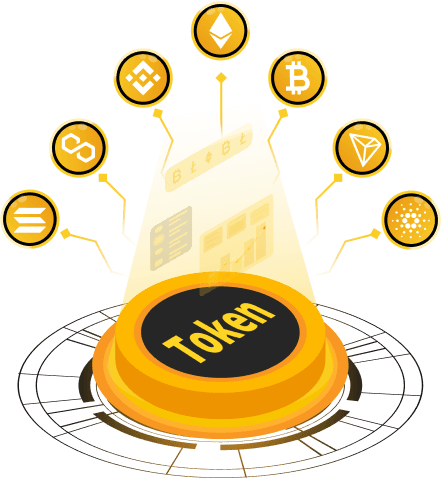Introduction
The rise of Telegram as a gaming platform has opened doors for game developers seeking efficient, secure, and scalable blockchain solutions. Integrating blockchain in Telegram games creates new ways for developers to incentivize players, introduce in-game tokens, and secure assets, among other benefits. However, the key to a successful implementation lies in choosing the right blockchain protocol tailored to Telegram’s user base and gaming features.
This article delves into various blockchain protocols that can power Telegram games and provides insights on how to select the most suitable option for a seamless gaming experience.
Leading Crypto Token Development Company Services
Elevate your website with our expertise.

Why Blockchain for Telegram Games?
The fusion of gaming and blockchain technology, especially on Telegram, has yielded significant growth opportunities. Here’s why developers are flocking to blockchain for Telegram gaming:
- Secure Ownership of Assets: Blockchain allows players to own their assets securely, reducing fraud risks.
- Incentivization: Using in-game tokens, developers can create reward systems, enhancing player engagement.
- Transparency: Transactions are recorded on an immutable ledger, making every action traceable.
- Scalability and Decentralization: Telegram games with millions of users benefit from scalable, decentralized infrastructures that handle high traffic efficiently.
Statistics underline the importance of these aspects: Blockchain games have shown an annual growth rate of over 42% in recent years.
Key Blockchain Protocols for Telegram Gaming
1. Ethereum
Ethereum has long been the go-to protocol for blockchain applications, thanks to its advanced smart contract capabilities.
- Advantages:
- Established Ecosystem: Ethereum has a robust ecosystem with vast developer support.
- Interoperability: Works seamlessly with other platforms and applications.
- DeFi and NFT Integration: Ethereum powers a significant share of DeFi and NFT projects, making it ideal for games that want to introduce tokenized assets or NFT collections.
- Drawbacks:
- High Transaction Fees: Ethereum’s gas fees can be a barrier for games with frequent transactions.
- Scalability Issues: While Ethereum 2.0 promises solutions, the current platform can experience slow transaction times.
- Best For: Complex games with NFT and DeFi elements that can absorb higher transaction costs.
Feature | Ethereum |
Smart Contract Capability | High |
Transaction Fees | High |
Developer Community | Strong |
2. Binance Smart Chain (BSC)
For developers seeking a more affordable and fast alternative, Binance Smart Chain is an appealing choice.
- Advantages:
- Lower Fees: BSC has notably lower transaction fees than Ethereum, making it suitable for games with microtransactions.
- Speed: Transactions are processed quickly, a crucial feature for real-time games.
- EVM Compatibility: Since BSC is EVM-compatible, it offers the same development tools as Ethereum, easing the transition for developers.
- Drawbacks:
- Centralization Concerns: Unlike other blockchains, BSC is more centralized, as it operates with fewer validators.
- Ecosystem Limitations: Compared to Ethereum, BSC’s ecosystem is less extensive, which may limit interoperability.
- Best For: Games that need fast transactions and low fees, but can tolerate some centralization.
Feature | Binance Smart Chain |
Transaction Speed | High |
Decentralization | Moderate |
Compatibility | EVM-Compatible |
3. Polygon
Polygon, a layer-2 solution for Ethereum, aims to address scalability and cost challenges associated with Ethereum.
- Advantages:
- Lower Transaction Costs: Polygon offers significantly reduced fees, making it accessible for high-volume transactions.
- Scalability: Built to support high throughput, Polygon is capable of handling the demands of massive multiplayer games.
- Easy Integration with Ethereum: Leveraging Ethereum’s security while enhancing speed and affordability.
- Drawbacks:
- Security: While it uses Ethereum’s security model, being a layer-2 solution may add complexity in securing assets.
- Limited NFT Support: Some limitations on NFT protocols may hinder certain types of games.
Best For: High-volume games that rely on microtransactions and require scalability without high fees.
Secure your future with expert token development!
Tailored solutions for your business needs.

Important Considerations for Choosing a Protocol
- Transaction Speed and Fees
- Protocols like Polygon and BSC are more affordable and faster, while Ethereum can become costly and slow under heavy load.
- Smart Contract Requirements
- For NFT Game Development, smart contracts are essential to handle unique assets. Token Consulting for custom token structures is crucial in such scenarios, as each protocol offers different levels of support for token standards.
- Community and Developer Support
- Protocols with strong community support (e.g., Ethereum) are easier to work with, given the abundance of resources and libraries available for development.
- Scalability and Decentralization
For games expecting large user bases, a scalable solution like Polygon or BSC can be ideal, as they handle high traffic while maintaining transaction speed.
Real-World Examples
- Axie Infinity (Ethereum + Ronin): Initially built on Ethereum, Axie Infinity migrated to Ronin, a custom sidechain, to reduce gas fees and increase scalability.
- CryptoBlades (BSC): Chose Binance Smart Chain to keep transaction fees low, appealing to users who make frequent transactions.
- Aavegotchi (Polygon): A game that leveraged Polygon’s low transaction fees and scalability, benefiting its large active user base.
Integrating In-Game Tokens with Blockchain in Telegram Games
To enhance monetization and engagement in Telegram games, developers often look to integrate in-game tokens. Choosing the right token type and understanding its implications are critical to a successful game launch.
For comprehensive Token Development, consulting with experts in Token Consulting is advised. Platforms like Ethereum offer ERC20 tokens, while BSC and Polygon support their versions. Consulting on Tokenomics can ensure that tokens are well-structured to attract and retain players while maintaining game economy stability.



